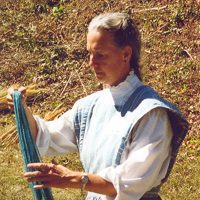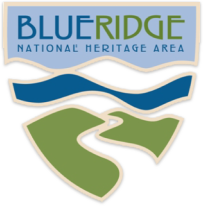
Since early childhood, Buncombe County native Dede Styles has been exposed to mountain traditions of the fiber arts. Her grandmother, Mabel Allen, was a weaver and a member of the Southern Highland Craft Guild. Styles remembers accompanying her grandmother to Guild events, and becoming enamored of the art of spinning by watching another Guild member at work. She was so mesmerized by the spinner, an older woman, she says, that “I have no recollection of ever talking to that lady. She must have thought, ‘Boy, Mrs. Allen has a really weird granddaughter.'”
Simply by watching her, and lots of practice, Styles learned to spin. The family had an old Appalachian high-wheel spinning wheel that was part of her grandfather’s collection, and though it was difficult to maneuver, she began to practice on this wheel. (She uses a high-wheel spinning wheel today.) When her sister asked for a horse, and her brother wanted a pet dog, Dede asked for a sheep of her very own, and when her wish was granted, she began spinning the sheep’s wool.
Styles says that she considers herself a dyer even more than a spinner, and this art too she learned early on. Her mother had a great interest in native plants, and shared much of her knowledge with her children so that, by the time Styles began to study the traditional process of creating natural dyes, she already knew how to recognize the plants that she needed. Today she is still interested in how native plants were used centuries ago to make dyes, and she collects many of the ingredients herself, like broomsedge, goldenrod, Queen Anne’s lace, wild grape, rhododendron, and black oak bark.
In addition to her skills as a craftsperson, Dede Styles has a Masters degree in Early Childhood Education. She finds this valuable in her work as a demonstrator, because it helps her gauge an audience’s level of understanding and background knowledge, and customize her explanations of the spinning and dyeing process accordingly. She has demonstrated widely at festivals and fairs, at the Mountain Farm Museum and the Biltmore Estate, and many other venues. Her goal, she says, is to “keep it alive . . . it needs to be kept alive.”
Availability
Dede Styles is available for demonstrations of spinning and dyeing. Her demonstrations are best suited to an outdoor setting, as they involve heat, combustible fuel, and colorful splatters. She considers requests for private lessons, consultations, and school programs.


